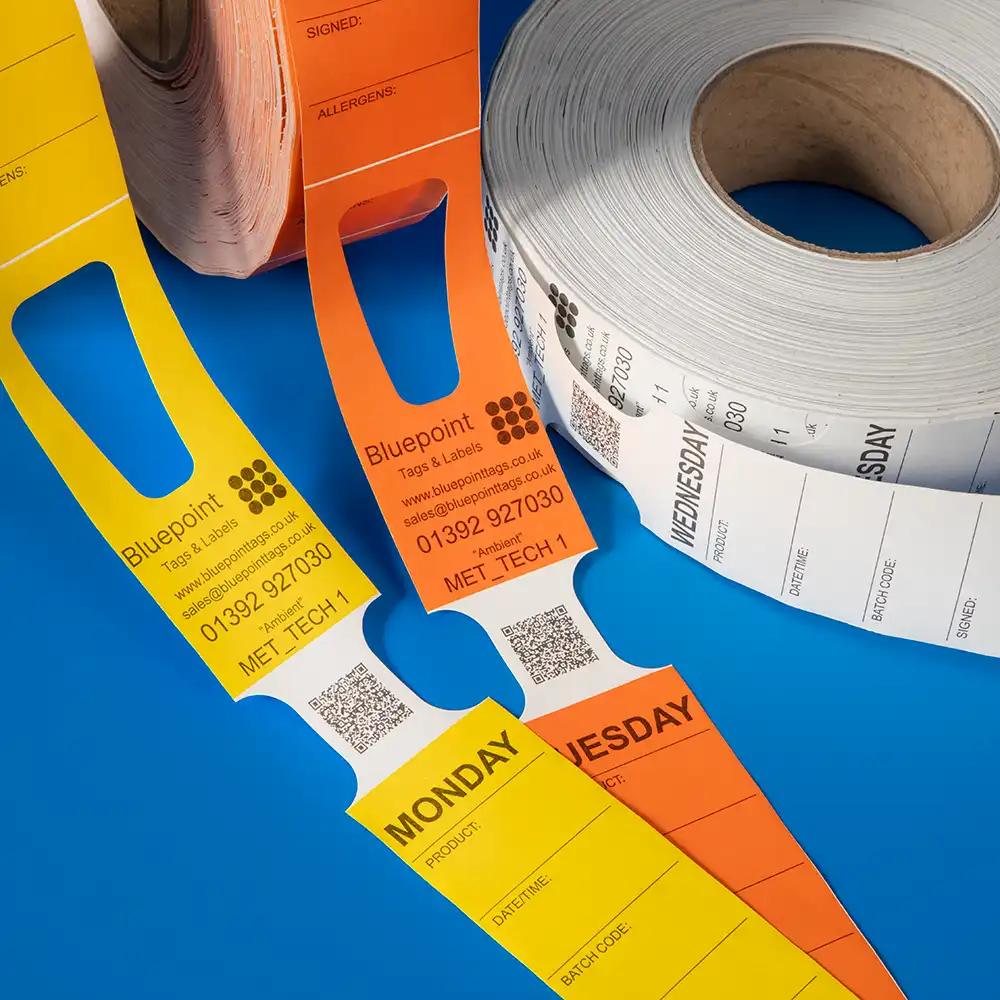Why Metal Detectable Labels Are a Must for Food Production
In today’s food production environment, ensuring safety, traceability and compliance isn’t optional, it’s essential. That’s why so many food processors are turning to metal detectable labels (also known as metal detectable tags) as a core part of their hygiene and quality control strategy. At Bluepoint Tags & Labels we know this sector inside-out, and our food-industry label solutions are manufactured specifically for producers who need food-safe labelling, full traceability and contamination prevention.


What are metal detectable labels?
Metal detectable labels are labelling solutions made from materials that can be picked up by metal detection systems. They are designed so that if the label (or part of it) falls or fragments into the production line or final product, it can be detected and the batch of contaminated food removed before reaching consumers. This is critical in food processing where foreign body contamination is a major hazard.
These labels often combine a foil or metal-embedded core with food-approved substrates and adhesives, making them suitable for the stringent demands of the food industry.


Why food processors need metal detectable tags and labels
Here are some key reasons why food production companies should specify metal detectable labels:
- Contamination prevention: In busy food production lines, even a small label fragment can become a foreign body hazard. Using metal detectable materials helps mitigate that risk.
- Traceability: The labels support full product traceability from ingredient to finished goods. This is important for recalls, audit trails and quality assurance.
- Compliance with food safety standards: Many food production environments require labels that are certified for contact, oven or freezer use, meet EC and FDA regulations, and are compatible with HACCP systems.
- Harsh environment resilience: Food processing means exposure to ovens, freezers, wash-down, moisture and chemicals. Labels must perform under these conditions.
- Colour-coding and process control: Using different coloured labels/tags helps in process control, zone identification, and colour-coded safe labelling strategies.

Key features to look for in food-safe metal detectable labels
When selecting metal detectable labels for food production, consider the following features:
- Metal detectable core/foil layer: Ensures detectability when utilising metal detection equipment.
- Food-approved materials: Labelling materials should comply with EC 1935/2004 and FDA standards where necessary.
- Temperature resistance: Choose labels designed for your process conditions - ambient, freezer, oven.
- Durability: Resistant to moisture, chemicals, abrasion, wash-down.
- Print-compatibility: Able to be pre-printed or over-printed on-site, compatible with roll or sheet formats, colour-coded if needed.
- Customisation and flexibility: A good supplier offers bespoke sizes and colours to match your line. “Multiple sizes from standard stock to customised solutions.


How Bluepoint supports food production with metal detectable labels
At Bluepoint, we manufacture our labels and tags in the UK (Totnes, Devon) and have built our offerings around the unique demands of the food production industry. Some of the ways we add value:
- We offer metal detectable self-tie or loop-lock labels, with a metal foil centre, designed to be used where labels need to be tethered to items, stacks, trollies or cages.
- We have self-adhesive metal detectable tapes and ambient/freezer labels suited to food processing lines.
- Our labels meet EC and FDA compliance, supporting HACCP systems and food safety audits.
- We offer fast turnaround, flexible sizes and colours, and the advice to help you select the right label for your production line.
- If you need printers, consumables or support, we can help provide you with the right solutions – simply get in touch with our friendly team today!

Best practice tips for deploying metal detectable labels in food production
- Map your production zones and identify critical points where label loss or contamination could occur (e.g., manual handling areas, rapid change-overs).
- Use colour-coded labels to help differentiate batches, zones, or process steps - this helps operators detect anomalies quickly.
- Train staff on correct label application, tethering (if using loop-lock/self-tie labels) and disposal of damaged labels.
- Integrate your labels with your traceability system, including batch numbers, dates and barcodes/QR codes if required.
- Regularly test your metal detection systems with known metal-detectable test equipment, including fragments of labels, to ensure compatibility and detection sensitivity.
- Keep sample packs of your label stock, maintain documented specifications (e.g. temperature rating, detectability test reports) to support audits.
Conclusion
In the food production sector, safety, compliance and traceability are not merely desirable, they are business critical. By choosing the right metal detectable labels from a trusted supplier, you significantly reduce your risk of contamination, support audit readiness, and improve production reliability. At Bluepoint, our range of metal detectable labels and tags is designed specifically for food production environments, from ambient to freezer to oven conditions - with full support and customisation available.
If you’d like to find out more about our food-industry labels, request a free sample pack, or get a quote, head over to our Food Production Labels & Tags page or speak to our customer service team today.




